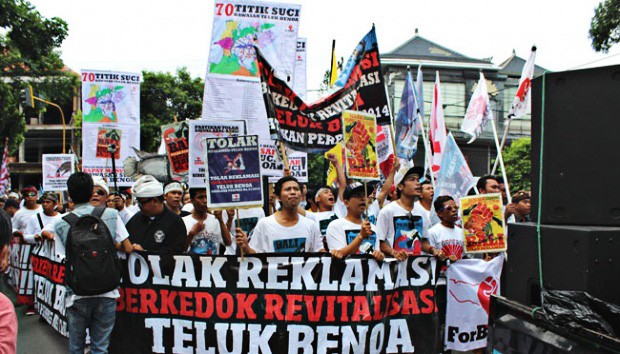Popular Reads
Top Results
Can't find what you're looking for?
View all search resultsPopular Reads
Top Results
Can't find what you're looking for?
View all search resultsHindu priests oppose Benoa Bay reclamation project
Change text size
Gift Premium Articles
to Anyone
T
he Sabha Pandita (high priests) of the Indonesian Hindu Religious Council (PHDI) have called on the government to review its decision over the controversial Benoa Bay reclamation project in Bali and to take spiritual values into account in shaping the future of Indonesia’s world-class tourist island.
PHDI previously issued an edict declaring Benoa Bay a sacred area.
There are many points in Benoa Bay believed to be sacred by Balinese Hindus, including temples, estuaries and seagrass areas, PHDI chairman Ida Pedanda gede Ketut Sebali Tianyar Arimbawa said.
"As religious leaders, we want to advise the government. As good citizens, we are obliged to convey our wish that the government safeguards Indonesia’s nature, people and values," said the high priest recently.
PHDI's high priests issued the edict on Benoa Bay in early April after holding a meeting to answer to the public uproar over the planned reclamation project in the southern part of the island. The project is set to be managed by PT Tirta Wahana Bali Internasional ( TWBI ), a company controlled by prominent tycoon Tommy Winata.
"If we see sacred points around Benoa Bay, it means that there is no space to carry out reclamation," Pedanda Tianyar said.
As a Hindu-majority province, the PHDI’s religious edicts have always influenced government policy in the region.
Bali's 2009 spatial planning bylaw, for example, accommodated the 1994 religious edict that stated the ocean, mountains and other areas of the island were sacred places.
The edict also led to a regulation that strictly controls development near sacred sites on cliffs, riverbanks, lakeshores and coastlines.
The 1994 edict was issued in response to public uproar over the construction of the Bali Nirwana Resort near the famous Tanah Lot Temple. The issuance of the edict created a sacred zone around temples, prohibiting the construction of tourist facilities within five kilometers of major temples, such as Besakih and Uluwatu, and within two kilometers of minor temples.
PDHI approved the development of the Bali Mandara toll road, launched in 2013, because the island's first toll road was desperately needed for the public, Pedanda Tianyar said.
The Bali Mandara toll road spans 12.7 kilometers and cost Rp 2.4 trillion to build. The road connects Denpasar, Kuta and Nusa Dua, and eases traffic congestion on the southern part of the island.
Still, the Benoa Bay reclamation project is thought to be different from the toll road project.
"The reclamation project is purely business and it poses a risk to nature and spiritual belief,” he said.
TWBI announced its plan to reclaim 700 hectares from Benoa Bay to build luxury tourist resorts. The company is currently working on an Environmental Impact Analysis ( Amdal ) document to use as a foundation to proceed with the project.
Many parties, including customary villages across the island, stakeholders in tourism, environmentalists and local residents, have voiced their objection to the plan after it was announced in 2013.
Bali Governor Made Mangku Pastika said he respected the high priests' decision.
However, the local government cannot do anything about the plan because the central government has authority over this particular issue.
Pastika expressed skepticism about the edict on Benoa Bay as a sacred area.
"If we talk about sacred areas, all areas in Bali are sacred. Does that mean we have to break down all the buildings in Sanur and Kuta?" he said.
A 2014 presidential regulation on the matter, signed by then president Susilo Bambang Yudhyono, gave permission for the reclamation project to go ahead after the status of Benoa Bay was changed from a green-belt water conservation area into a commercial zone. (rin)










